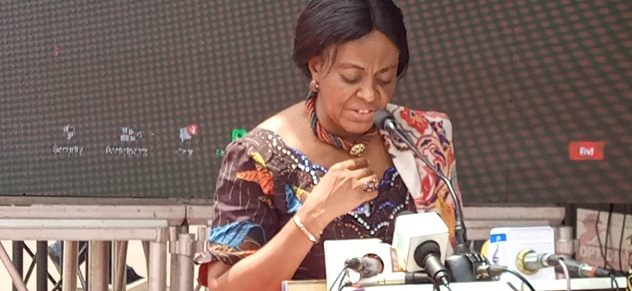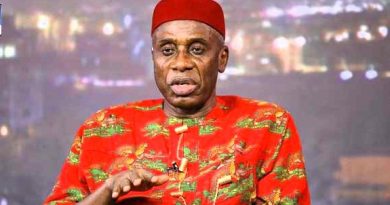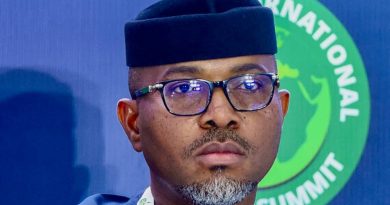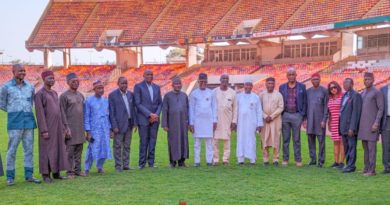Ascertain the People’s Need Before Embarking on Constituency Projects- Amb. Ekpa Urges NASS Members
NASS Correspondent
The Permanent Secretary, Federal Ministry of Special Duties and Intergovernmental Affairs, Ambassador Anthonia Ekpa, has urged National Assembly members to go back to their communities to find out what exactly their people need, rather than just sitting in their offices to decide what to do with the constituency projects.
She made this known recently at a 2-day National Retreat for Local Government Chairmen and Executives in Nigeria, organized by the Ministry of Special Duties and Intergovernmental Affairs in Uyo, with the theme: “Good governance, Resource Mobilization and Public Financial Management for Rural Development”.
Speaking as a discussant on the subtopic, “the three tiers of governance interface in the implementation of zonal intervention and constituency project”, Amb. Ekpa noted that the constituency project affords the National Assembly member the opportunity to interface with his people at the local level, as well as to align with the state government.
While explaining that the entire idea of constituency project is not just a Nigerian Initiative, she pointed out her Ministry in 2013 carried out a survey on what is called “constituency and community development project”, adding that some countries in Sub-Saharan Africa carry out constituency projects but the difference between those countries and Nigeria, is the fact that the constituency projects in those countries are backed by law but in Nigeria, it is a development oriented project.
She further stated that when a government is elected it has a mandate to bring development to the citizenry and development policies are generated for the sake of the people, noting that the Goal 17 in the Sustainable Development Goals (SDG) is about Partnership for development and the other goals are all people-centered.
According to her, “Constituency projects are necessary. I am not a senator, neither am I a National Assembly member but I know, being in the Ministry that supervises the implementation of constituency projects and having myself sometime ago been involved in the monitoring of constituency projects, I say that that is one achievement of the federal government.
“What the federal government does is to award National Assembly members to go back to their communities and see where the problems are and try to address them through this constituency project. So it is not just a Nigerian Affair, it is both an African and a global project.
“The purpose of constituency project and these are backed by the Presidency, both houses of the National Assembly and then it is also supported by extant circulars of the Federation. You are expected as a National Assembly member to go back to your community, to those men and women who stood in the rain and in the sun and lined up to vote for you, to go back to that community and be one of them. To find out, what exactly do my people need? In addition to improving the people’s awareness of their representatives, it also enables the citizens to align with your aspirations for their Welfare.
“Unfortunately, what we have noticed that needs to be addressed is to ensure that members in addition to reaching out to their constituents, also reach out to the state government and inform them about the money they’ve received from the federal government to deliver projects in their constituency and find out from the governor what the money can be used for. That is the ideal thing.
“That, in addition to discussing at the local level with your constituents, you are to find out what exactly the people need, but what is obtainable is that the Honourable members sit in their offices and just decide what to do with the constituency project. That is not what it is supposed to be.
“It is a stakeholder interactive activity where the stakeholders actually know what you want to bring to them, then the state government also should be aware because sometimes we have witnessed in our attempts at inspecting projects that a state government is fixing a road and then the National Assembly member or Senator goes and put in his constituency the repair and fixing of the same road and the federal government releases money to the Senator to implement, then the Ministry of Special Duties comes to inspect and notices that there is a signboard of the state government standing on the same road the House of Assembly member has come to build”, she said.
Dr. Ekpa while emphasizing that there is a nexus and a connection between the federal, state and local, said the most critical content of the constituency project is the inspection which is ongoing, adding also that there is a circular that mandates the Federal Ministry of Special Duties to go to every Ministries, Departments and Agencies to ensure that those constituency project and zonal projects that are given to national Assembly members are actually implemented.
“We actually go to the communities to inspect the level of implementation and we grade a member. So, constituents, local governments councilors, chairmen are supposed to be informed by the House of Representatives member that he or she is coming to the local government to have this intervention and the local government chairmen should be carried along in the thinking and supervision because if they are not carried along, there is the tendency for members to just abandon these projects because they are very busy with law making.
“When I was involved in constituency projects inspection, if I went to a local government area, the office of the local government Chairman is the first place I will visit and I will ask him to accompany me to see what his member is doing and if we see that work has not been done properly, we will say we don’t accept it and the Federal Ministry of special Duties and Intergovernmental Affairs will report and that contractor will not be paid.
“What we are really saying is that the constituency project is an aggregation of intervention by the federal government to ensure that development is brought to the local level. It is a good thing but, like all things in Nigeria, it has not been followed through effectively and that is why the federal ministry of special Duties and Intergovernmental Affairs has to sit up and we are trying to sit up”, she noted.
She stressed that the Ministry which is big and important has unfortunately been affected by change in government which tends to distort the coordination process of following up on what has been begun, and has not allowed the government to have adequate strategized processes for the implementation, monitoring and reporting more importantly to Nigerias of constituency projects.
In her words, “If the Ministry does what it has to do, which it is doing now, the Ministry is supposed to know abandoned projects because we did have and we are still collating abandoned projects. When a project is started and a member’s tenure elapses, the senator that takes over should be made to complete the project of his predecessor, so that we do not have abandoned projects in local governments all over the place by National Assembly members.
“On the part of the Ministry of Special Duties and Intergovernmental Affairs, the government has given it the right to demand from MDAs the monitoring funds for those projects. So every project that is in the Appropriation for a year, has an amount which the Ministry is supposed to tap from to ensure that that project is inspected, so that is what we are trying to do now in the Ministry.
“I can say very boldly that what’s happening in South Africa, Tanzania, Nairobi and Rwanda are the best examples of how constituency projects can bring about development. Moreso, now that Nigeria’s index in the implementation of the sustainable development goals is crawling to grow, it is important that we maintain constituency projects.
“The National Development Plan, the Economic Sustainability Plan of government as well as the Economic Growth and Sustainability indexes that we have today is showing us that Nigeria’s capacity to grow and reach out to its millions of citizens is possible if we can bring development to the grassroots which is what constituency projects are doing. There is a link between the federal, state and local governments and the local government Chairmen are to ask questions from those National Assembly members to know what they are bringing to their states”, she concluded.
(The Sight News)




